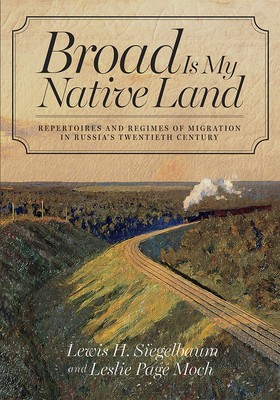
- We will send in 10–14 business days.
- Author: Lewis H Siegelbaum
- Publisher: Cornell University Press
- ISBN-10: 080145333X
- ISBN-13: 9780801453335
- Format: 17.3 x 23.9 x 2.8 cm, hardcover
- Language: English
- SAVE -10% with code: EXTRA
Reviews
Description
Whether voluntary or coerced, hopeful or desperate, people moved in unprecedented numbers across Russia's vast territory during the twentieth century. Broad Is My Native Land is the first history of late imperial, Soviet, and post-Soviet Russia through the lens of migration. Lewis H. Siegelbaum and Leslie Page Moch tell the stories of Russians on the move, capturing the rich variety of their experiences by distinguishing among categories of migrants--settlers, seasonal workers, migrants to the city, career and military migrants, evacuees and refugees, deportees, and itinerants. So vast and diverse was Russian political space that in their journeys, migrants often crossed multiple cultural, linguistic, and administrative borders. By comparing the institutions and experiences of migration across the century and placing Russia in an international context, Siegelbaum and Moch have made a magisterial contribution to both the history of Russia and the study of global migration.The authors draw on three kinds of sources: letters to authorities (typically appeals for assistance); the myriad forms employed in communication about the provision of transportation, food, accommodation, and employment for migrants; and interviews with and memoirs by people who moved or were moved, often under the most harrowing of circumstances. Taken together, these sources reveal the complex relationship between the regimes of state control that sought to regulate internal movement and the tactical repertoires employed by the migrants themselves in their often successful attempts to manipulate, resist, and survive these official directives.
EXTRA 10 % discount with code: EXTRA
The promotion ends in 19d.23:09:52
The discount code is valid when purchasing from 10 €. Discounts do not stack.
- Author: Lewis H Siegelbaum
- Publisher: Cornell University Press
- ISBN-10: 080145333X
- ISBN-13: 9780801453335
- Format: 17.3 x 23.9 x 2.8 cm, hardcover
- Language: English English
Whether voluntary or coerced, hopeful or desperate, people moved in unprecedented numbers across Russia's vast territory during the twentieth century. Broad Is My Native Land is the first history of late imperial, Soviet, and post-Soviet Russia through the lens of migration. Lewis H. Siegelbaum and Leslie Page Moch tell the stories of Russians on the move, capturing the rich variety of their experiences by distinguishing among categories of migrants--settlers, seasonal workers, migrants to the city, career and military migrants, evacuees and refugees, deportees, and itinerants. So vast and diverse was Russian political space that in their journeys, migrants often crossed multiple cultural, linguistic, and administrative borders. By comparing the institutions and experiences of migration across the century and placing Russia in an international context, Siegelbaum and Moch have made a magisterial contribution to both the history of Russia and the study of global migration.The authors draw on three kinds of sources: letters to authorities (typically appeals for assistance); the myriad forms employed in communication about the provision of transportation, food, accommodation, and employment for migrants; and interviews with and memoirs by people who moved or were moved, often under the most harrowing of circumstances. Taken together, these sources reveal the complex relationship between the regimes of state control that sought to regulate internal movement and the tactical repertoires employed by the migrants themselves in their often successful attempts to manipulate, resist, and survive these official directives.


Reviews